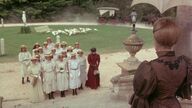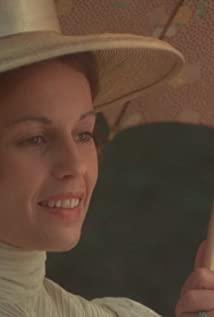Obviously, the director of "Picnic on the Cliff" had the impulse to lead the audience to ask "Where are the disappearing girls and female teachers?", and obviously he did this: the movie ended, the big mystery was not solved, so Audiences like me have been asking "So how did they disappear?" Then they wondered, what was the director's idea of making this movie? Then I wonder, why is this movie classified as a horror theme?
After watching the movie, I read some friends' film reviews and found that this movie was once regarded as a feminist movie. This has inspired me, and I would like to try to say some contempt for this.
First of all, this movie is obviously related to sex. The girl’s white skirt and reserved lady manners show women’s protection and imprisonment of themselves. The opposite is the male’s obscene appreciation of chaste girls—for example, when Potty watches the girls cross the stream. At the same time, our audience is also immersed in the "beauty" viewing like him. Although there may be no obscene thoughts, the feeling of beauty mainly comes from the purity of the girls. The question is why is the pure girl "beautiful"? Why must girls be pure? Because this pure beauty is constructed by a male-dominated society.
The director fiercely cut off this "gaze" and "appreciation" of beauty , but the way to cut off is not to "destroy" the constructed "beauty", such as girls being raped, so that people do not want to watch it again; and It is a vehicle that directly "destroys" beauty, so that people can no longer watch and reconstruct, but can only be immersed in the imagination of trying to watch (for example, after Michael cannot find Miranda, he can only appreciate her through phantoms and swan fantasy; For example, our audiences continue to have questions when they can't find Miranda), so that these girls become true untouchable and untouchable "angels".
In this sense, we can say that this movie is feminist, and it makes sense to regard the rock on the cliff as a symbol of a male phallus as mentioned in some film reviews. Surrounded by rocks with male faces and phallic rocks, overlooking the pure girls, they symbolize the patriarchal society’s gaze and suppression of women, while the three girls drilled out of a gap in the rock group symbolize their treatment of men. Defection surrounded by rights.
Edith, who ran back to report the situation, was a female symbol of reluctance and daring to defect, so she was frightened to stop when she saw Miranda and the three walking towards the gap, and she ran with only underwear on Teacher McLaw (the female teacher who disappeared) Feeling ridiculous and shameful (of course we don’t know whether this is true or Edith’s fiction, but in any case it shows her insistence on the importance of purity and virginity); Irma , who was later discovered and rescued, symbolizes The defected woman who gave up halfway, the loss of her corset implies that she had tried to get rid of the suppression of patriarchy and the requirement of "chaste", and her amnesia and return meant the denial of the female defect and the return of the patriarchal society.
This can also explain Michael 's behavior. Michael tried to find Miranda and the others, but why was he panicked after discovering Irma? I am more inclined to think that it is Michael who discovered the path to "another world" , another world that Miranda and the others can reach after defecting, and he may be seeing Miranda and the others moving forward (of course how is this world? Yes, just imagine). As a man accustomed to the patriarchal society and a man, Michael must have felt strange and terrible when he saw such a world existed: he might think Miranda and their actions were dangerous, so he wanted to save them; he might also think They were incorrect, so I wanted to stop them-so it's very possible that Irma was dragged back by Michael, and Miranda was dragged to the corner of her clothes, but was not dragged back.
Of course, I need to state that this is just my hypothesis in a symbolic sense. I think it makes sense, so I share it with you, but it is not necessarily correct. In this scenario, Michael symbolizes the patriarchal society, and Irma is the patriarchal society. Re-suppressed women, and there is a symbol in the symbol, that is, Irma's amnesia is a symbol of women in the patriarchal society that are forced to completely give up the idea of defecting.
But Michael is not a strict patriarch . This can be seen from the different attitudes of Potty and Michael when they admire the girls jumping over the stream, so he did not choose to "expose" the existence of this world to people; but at the same time as Dasein’s men in society felt that something was wrong, so he showed Potty that piece of clothing, suggesting that Potty would save (or stop) the girls, but Potty did not discover the world (maybe this The other world may not necessarily be seen).
And if you continue to look at this film from a feminist perspective, you will find the film's horror: the stability of this patriarchal society is maintained and reinforced by men and women. The defectors are not only obstructed by men, but also blamed by women—the most frightening scene in the film. After recovering, Irma returned to school to bid farewell to the girls, but was questioned and questioned by the girls. Pushing: They are asking where the other two girls have gone. In a gender symbolic sense, it is the other two patriarchal societies' defectors. In this sense, other women's search for missing girls and female teachers in the film also appears sad and terrifying-because behind it means that the remaining women are hunting female defectors. Of course, this is too much interpretation, just for reference.
In addition, there is another question: Why does the film use many close-ups and plots to emphasize the beauty of Miranda ? And why did Edith only stop Miranda and not the others when they saw the three girls leave? I think this is to treat Miranda as a representative who has the most necessary defection : her beauty is recognized by both the same sex and the opposite sex. It is true beauty, but the beauty that is loved by the same sex cannot be accepted (Miranda and Sara's Same-sex love), but can only live under the beauty constructed by men (the French teacher’s appreciation of her is also a male gaze, because she uses a male painter’s goddess painting to fit the beauty of Miranda), in a sense It was the same-sex love that caused her awakening, a deeper awakening than other girls.
The defection of the three girls is very ritual : the solemn music, the majestic scenery, the free dance, the touch of wild animals, and the black shoes and socks that the girls take off their restraints, are coherently in the slightly deformed picture. Walking into the crevices of the rocks is like a "sacrifice" ceremony. "One million years is for us." The girls sacrificed their past, sacrificed with their purity, and entered into what truly belonged to them. world.
And Sarah is overwhelmed by the patriarchal society and materialistic society girl. She also represents the fourth category of women (the first three categories: 1. Miranda, a defector from the patriarchal society; 2. Irma, who returned halfway; and 3. Edith, the defender of patriarchy), that is, those who want to defect but cannot. The biggest dilemma that Sara faces is: no money. There is no material support. She could not defect with Miranda because she was forbidden to participate in the picnic because she did not pay the tuition in time; she could not stay here in the society with the thoughts of Miranda, because the patriarchal society also needs money to continue to "live legally." "--Like the wealthy Irma. But Sarah has neither a man to attach to nor the ability to survive. She can only choose to commit suicide, who cannot belong to either place.
The above is a speculation based on "feminism". But I think there is still a bit of horror in this movie. This is something I experienced accidentally, and it may not be correct. It is just for sharing. Teacher Dai Jinhua once mentioned in class: Horror comes from the outside, and horror comes from the heart. So this film is silently engulfed by uncontrollable external forces .
After class last night, I went to push my bicycle in the corner of the carport, and suddenly felt a panic of fear in the darkness and silence: Will I suddenly disappear at this time? No one will "save" and no one will stop, then will I be silently swallowed up here at this moment like "the rise and fall of all things and all things have their own definite time and place" as mentioned in the film Woolen cloth? But let's think about it, since there is such a powerful unknown power, wouldn't everyone die like ants, and everyone's existence is just a part of a "ritual" controlled by an unknown power? Thinking further, is there someone around us being swallowed silently, without cause and effect, only at this moment, when the creatures dissipate, but we know nothing, can never predict and never know? I can't think about it anymore.
Of course, I still have a lot of doubts about the movie, mainly focusing on Mr. McLough. For example, why did I give a close-up of this graphic in Mr. McLaw's book? Why did Mr. Mike Law disappear? What was the red cloud that Edith saw? ... Maybe this is the director's intention, let us always think, always feel and cherish our existence.
View more about Picnic at Hanging Rock reviews











